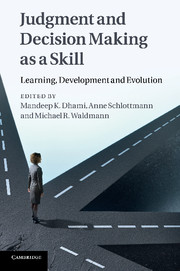Book contents
- Frontmatter
- Contents
- Figures
- Contributors
- Preface
- Acknowledgments
- Chapter cross-reference table
- Part I Evolutionary and neural bases of JDM
- Part II Developmental approaches to JDM
- Part III Learning JDM
- Part IV Improving and aiding JDM
- Conclusion
- 11 Perspectives on judgment and decision making as a skill
- Index
- References
11 - Perspectives on judgment and decision making as a skill
Published online by Cambridge University Press: 05 December 2011
- Frontmatter
- Contents
- Figures
- Contributors
- Preface
- Acknowledgments
- Chapter cross-reference table
- Part I Evolutionary and neural bases of JDM
- Part II Developmental approaches to JDM
- Part III Learning JDM
- Part IV Improving and aiding JDM
- Conclusion
- 11 Perspectives on judgment and decision making as a skill
- Index
- References
Summary
Introduction, Mandeep K. Dhami, Anne Schlottmann, and Michael R. Waldmann
In conclusion, rather than present a summary of the preceding chapters, we invited nine eminent past presidents of the Society for Judgment and Decision Making (SJDM) to provide personal perspectives on the concept of JDM as a dynamic skill. These scholars were not asked to comment on the chapters in this book, but rather to highlight their personal points of contact with the notion of JDM as a dynamic skill. The following perspectives offer historical accounts, and also point to future lines of research.
Shanteau describes how over the years he has highlighted the importance of training and skill acquisition in JDM, but feels “blue” that this view has not been more popular. Wallsten remembers the benefits of learning for JDM performance found in a study that he conducted 30 years ago, and confesses that he has only recently begun to revisit this important finding. Fischhoff points out that a sound understanding of the normative implications of tasks has laid a better foundation for the study of dynamically changing skills, especially in development. Levin and colleagues provide useful examples of their research on the developmental and neurological bases of JDM skills. Reyna highlights how her fuzzy trace theory taps into JDM processes that develop over time and experience, has neurological correlates, and may be evolutionarily adaptive. Baron reveals how he now finds himself in search of the developmental origins of the types of moral heuristics and biases that he has studied during his career. Hogarth shares three steps he has developed during decades of teaching decision making that can help people make better decisions. Klayman reveals that despite decades of studying learning and development of JDM, he still seeks a greater understanding of how decision makers “get that way.” Finally, Birnbaum points to the methodological factors that have limited our understanding of JDM as a skill, and presents a challenge for future researchers: to explain how and why JDM skills change. Overall, the following perspectives provide a rare glimpse of the personalized views of those who have made significant contributions to the field of human JDM.
Information
- Type
- Chapter
- Information
- Judgment and Decision Making as a SkillLearning, Development and Evolution, pp. 291 - 306Publisher: Cambridge University PressPrint publication year: 2011
References
Accessibility standard: Unknown
Why this information is here
This section outlines the accessibility features of this content - including support for screen readers, full keyboard navigation and high-contrast display options. This may not be relevant for you.Accessibility Information
- 1
- Cited by
